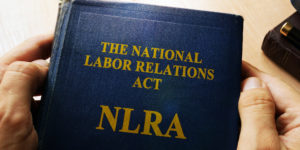NLRB Provides Employers Greater Leeway to Discipline Abusive Employees
July 24, 2020 by John Freeman
Under the National Labor Relations Act (“NLRA”), which applies to employers even though its employees are not members of a union, employees have the right to engage in communications and activities regarding their wages, hours and working conditions. This right is commonly referred to as protected Section 7 activity. At times, an employee’s protected Section 7 communications or activity may involve outrageous conduct, and even profane statements, directed to other employees and even their own supervisors. Such conduct, while it may be protected as Section 7 activity because it involves an employee’s hours, wages or working conditions, may also constitute racial and sexual language or activity that is abusive, bullying or uncivil behavior. If so, such conduct may also violate the federal and state anti-discrimination, anti-sexual harassment and other anti-harassment laws.

Thus, an employer may want to consider whether it can take disciplinary action against such an abusive employee engaged in protected Section 7 activity when such activity also involves abusive harmful conduct to other employees and is also a violation of anti-discrimination and anti-harassment laws. On July 21, 2020, the National Labor Relations Board (“NLRB”) issued a decision that addresses such situation and which may provide some direction to employers when faced with such actions by abusive employees.
The NLRB Decision
The NLRB is the federal government agency that enforces the NLRA, including Section 7 of the Act, which provides for an employee’s right to engage in protected communications and activity that concerns the employee’s wages, hours and working conditions, and prohibits retaliation by the employer against the employee engaging in such activity. In General Motors LLC and Charles Robinson, Cases 14-CA-197985 and 14-CA-208242, the employee’s activity, on several occasions, consisted of profane or racially offensive conduct towards management when the employee and management were discussing overtime for employees among other items affecting employees’ working conditions. Such profane language included the F-word and other profanities. The racially offensive conduct included the employee lowering his voice and mockingly acting as a caricature of a slave. The employer suspended the employee on each occasion for various time periods. An unfair labor practice charge was filed on behalf of the employee that asserted that the employee was engaging in protected Section 7 activity and that his suspensions were discriminatory disciplinary actions that violated the NLRA.
The NLRB in such case set forth the standard to be applied to such abusive conduct that occurs in the context of protected Section 7 activity and the employer’s disciplinary action against the employee. That standard is as follows: If the allegation in the unfair labor practice charge is that the employer’s discipline was motivated by an employee’s Section 7 activity, then it must be shown that (1) the employee engaged in Section 7 activity; (2) the employer knew of that activity; and, (3) the employer had an animus against the Section 7 activity. These three factors must be shown by sufficient evidence to establish a causal relationship between the employer’s discipline and the employee’s Section 7 activity. If these three factors and the causal relationship is shown, then the employer, to show it was not engaging in an unfair labor practice, must prove it would have taken the same disciplinary action for such employee’s activity even in the absence of the Section 7 activity. That is, if the employer shows that it would have issued the same discipline for unprotected, abusive speech or conduct if the protected Section 7 activity had not occurred, for instance discipline pursuant to the employer’s obligation under an anti-discrimination or anti-harassment law such as Title VII, then an employer would be within its rights to administer the discipline it did.
Impact of the Decision
Neither the NLRB nor this decision interprets or applies other federal, state or local anti-discrimination or anti-harassment laws, and the decision notes that a part of the NLRB’s duty is to protect employees from interference in the exercise of their Section 7 rights. It does, however, acknowledge that those laws may apply to an employee’s abusive conduct. The decision also makes clear that the NLRA, including an employee’s Section 7 rights, is not intended to provide protection for abusive conduct and from nondiscriminatory discipline, or that abusive conduct must necessarily be tolerated for Section 7 rights to be meaningful. The decision should assist employers and their attorneys in distinguishing between abusive conduct that is not protected by Section 7 and from conduct that is protected, and then taking the appropriate action. Meeting the standard set forth in this decision involves legal concepts and principles, and an attorney should be consulted to analyze a situation and apply the applicable law.



